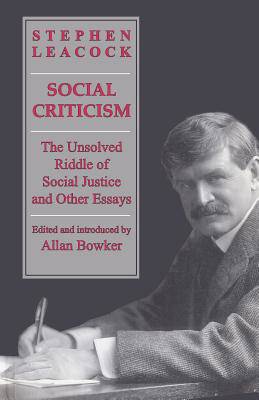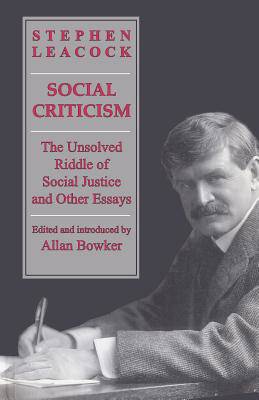
Je cadeautjes zeker op tijd in huis hebben voor de feestdagen? Kom langs in onze winkels en vind het perfecte geschenk!
- Afhalen na 1 uur in een winkel met voorraad
- Gratis thuislevering in België vanaf € 30
- Ruim aanbod met 7 miljoen producten
Je cadeautjes zeker op tijd in huis hebben voor de feestdagen? Kom langs in onze winkels en vind het perfecte geschenk!
- Afhalen na 1 uur in een winkel met voorraad
- Gratis thuislevering in België vanaf € 30
- Ruim aanbod met 7 miljoen producten
Zoeken
€ 53,45
+ 106 punten
Omschrijving
Stephen Leacock, long celebrated as Canada's foremost humorist and social satirist, has received little recognition for his considerable accomplishments as a serious thinker and social critic. In fact, Leacock was a professor of political economy, and more than half of his writings addressed the pressing issues of his day. This volume represents the neglected aspect of Leacock's career, gathering together his writings on a range of subjects, including imperialism, education and culture, religion and morality, feminism, prohibition, and social justice.
The collection begins with 'Greater Canada: an appeal, ' which dates from 1907, when Leacock was a popular lecturer advancing the cause of imperialism. Bowker points out that, for Leacock, imperialism was more a spiritual mission than a political agenda, representing the opportunity to unite Canadians, to inspire allegiance to a lofty tradition, and thereby to combat the threat of materialism, urbanism, fragmentation, and continentalism. These themes resurface in subsequent essays, culminating in The Unsolved Riddle of Social Justice, which was published in 1920. Carefully selected, and prefaced with an updated introduction to Leacock's life and work, these essays contribute to our understanding of Leacock and illuminate his role as a major figure in Canadian intellectual history.
The collection begins with 'Greater Canada: an appeal, ' which dates from 1907, when Leacock was a popular lecturer advancing the cause of imperialism. Bowker points out that, for Leacock, imperialism was more a spiritual mission than a political agenda, representing the opportunity to unite Canadians, to inspire allegiance to a lofty tradition, and thereby to combat the threat of materialism, urbanism, fragmentation, and continentalism. These themes resurface in subsequent essays, culminating in The Unsolved Riddle of Social Justice, which was published in 1920. Carefully selected, and prefaced with an updated introduction to Leacock's life and work, these essays contribute to our understanding of Leacock and illuminate his role as a major figure in Canadian intellectual history.
Specificaties
Betrokkenen
- Auteur(s):
- Uitgeverij:
Inhoud
- Aantal bladzijden:
- 145
- Taal:
- Engels
- Reeks:
Eigenschappen
- Productcode (EAN):
- 9781487586911
- Verschijningsdatum:
- 15/12/1973
- Uitvoering:
- Paperback
- Formaat:
- Trade paperback (VS)
- Afmetingen:
- 140 mm x 216 mm
- Gewicht:
- 267 g

Alleen bij Standaard Boekhandel
+ 106 punten op je klantenkaart van Standaard Boekhandel
Beoordelingen
We publiceren alleen reviews die voldoen aan de voorwaarden voor reviews. Bekijk onze voorwaarden voor reviews.









